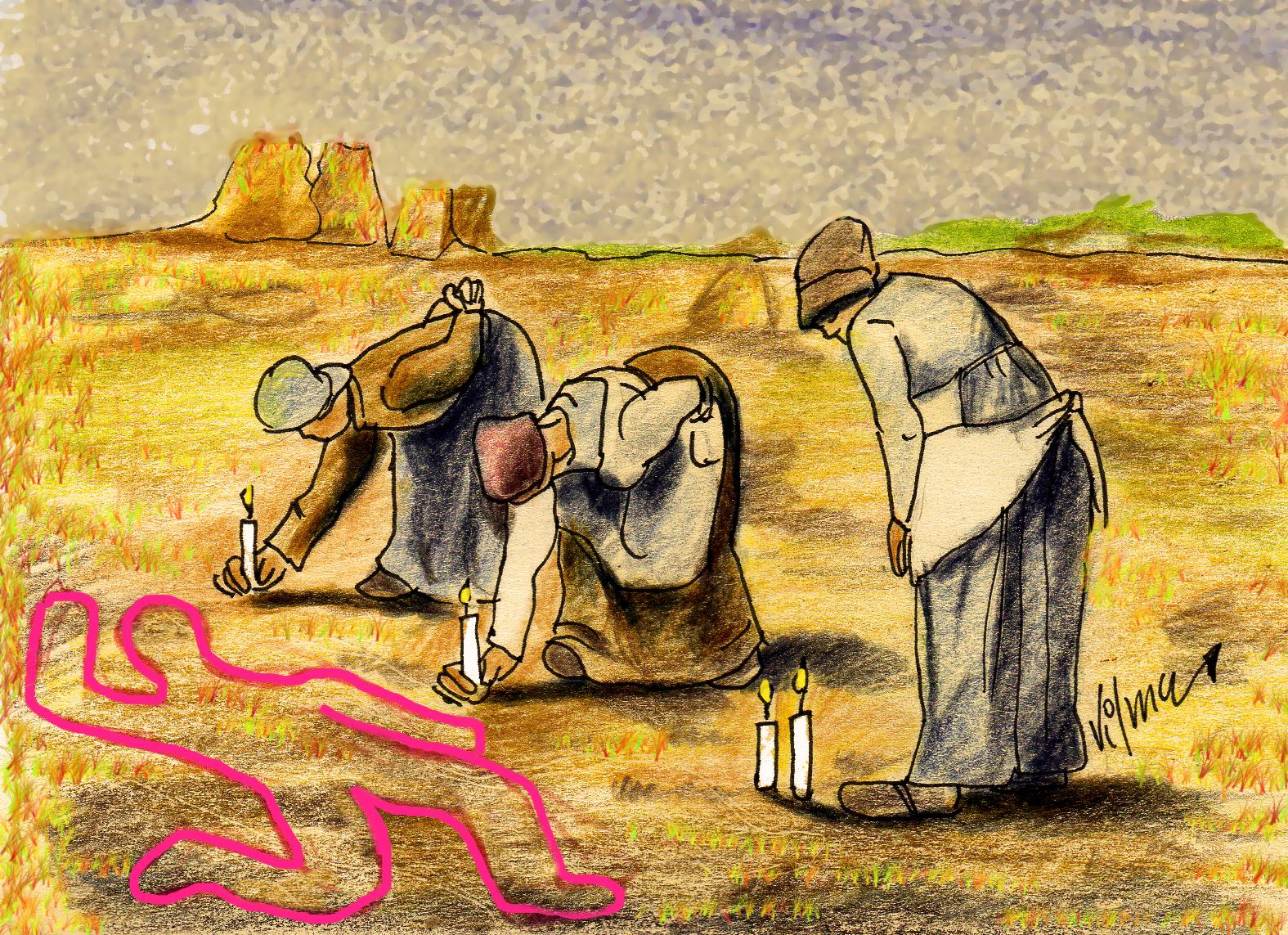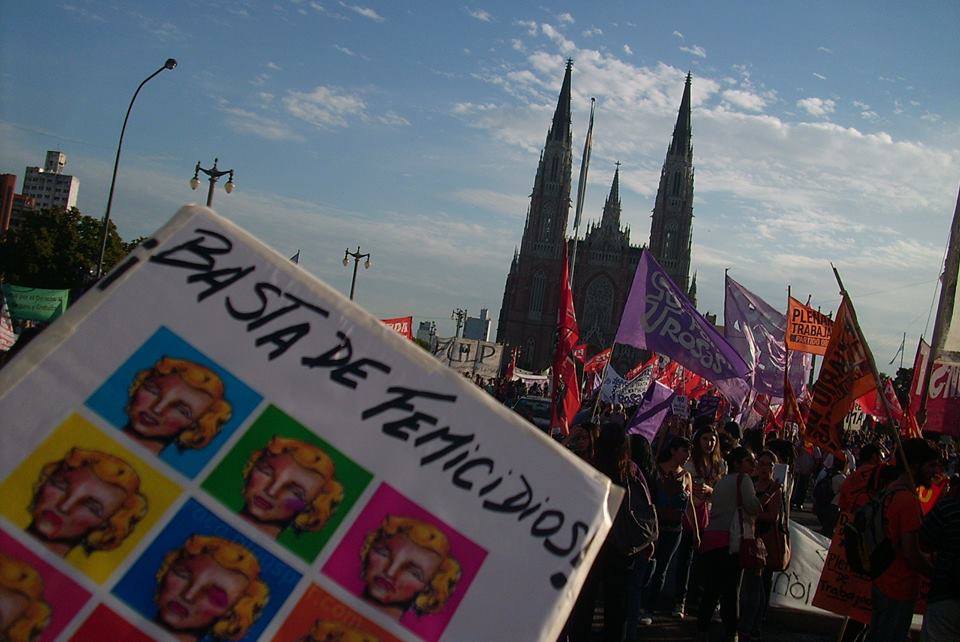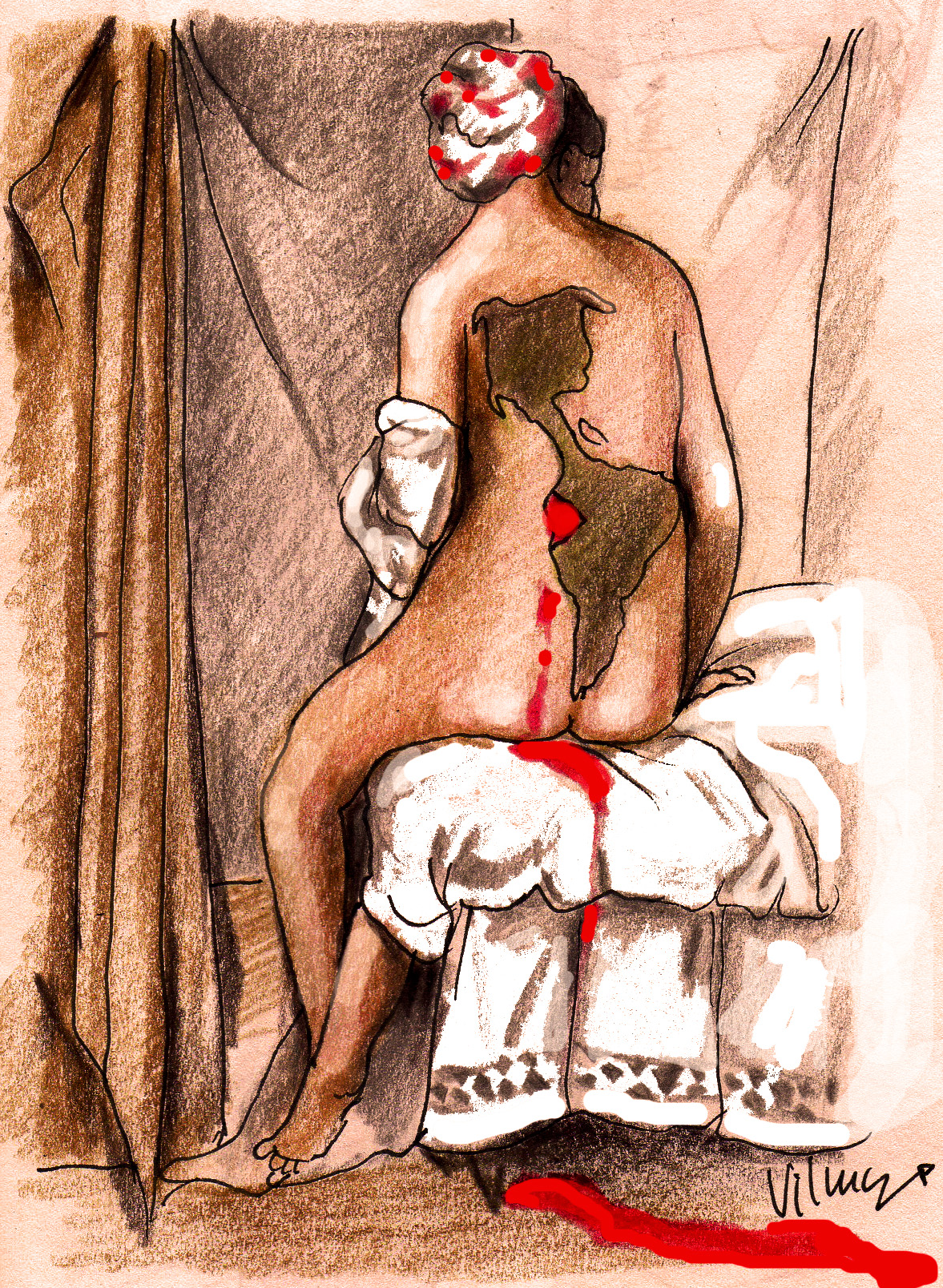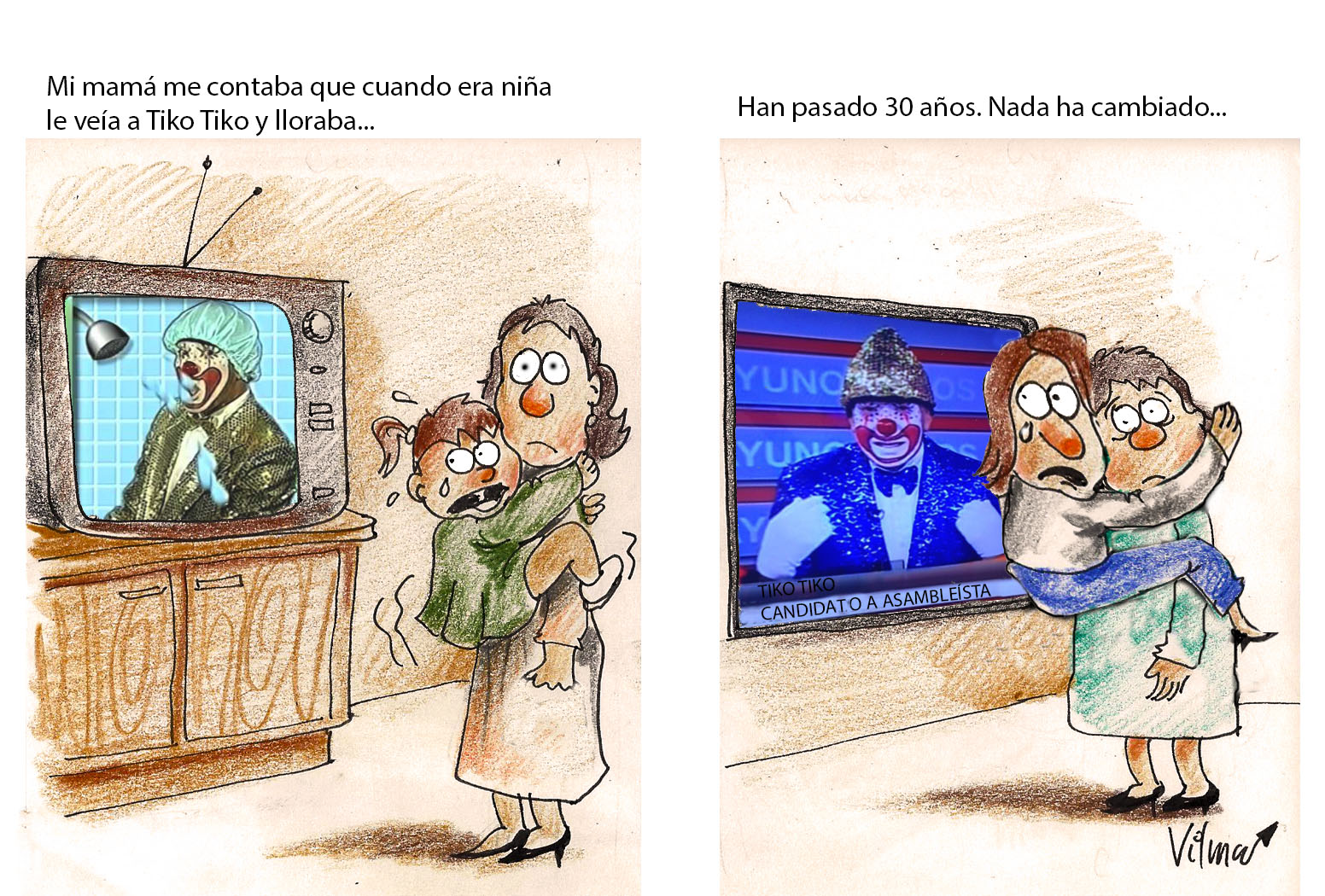Making the Powerful Feel Naked: An Interview with Vilma Vargas
by Emma Creighton / February 20, 2017 / No comments

Artist Vilma Vargas
Ecuadorian president Rafael Correa is not a fan of cartoonist Vilma Vargas. Her work primarily confronts human rights issues, the environment, and corruption in her country. Her politically charged work has drawn criticism from his regime, and last May an exhibition of her work was censored by Ecuador’s cultural organization. Nevertheless, she continues to work as a political and social advocate, fighting for freedom of speech and the opening of civic discourse in her work.
Vilma Vargas was an Artist Protection Fund fellow in residence at City of Asylum in 2016. She sat down with Sampsonia Way Magazine to discuss the artist’s craft, an unnerving break-in at her home in Ecuador, President Correa’s crackdown on journalists, and the power of the image.
When did you know that you were an artist? Why did you become a political cartoonist?
I think that the cartoonist’s profession starts basically when you realize that you are pretty useless for just about everything except for drawing and painting. I don’t know if there is ever a specific moment when you say, “Oh I’m an artist!” I just know that I am an artist. I think the artist profession is something you can’t learn in college. To be an artist is to think, to learn, to read, to travel. It’s everything. It’s a lifestyle. Everyday I’m learning through reading and drawing.
As for the reason why I draw political cartoons: I think that the most important influencers in Ecuador are the politicians. Both the politicians themselves and politics influence all lives. It is the job of cartoonist to copy reality, and drawing is the language of cartoonist with which the cartoonist captures reality. I also prefer drawing about human rights, women’s rights, and the justice system in my country because these are the issues that we struggle with every day.
Humor never lies to power.
Here in the United States there are many female cartoonists, but in South America there are really only two. I think it’s because in Latin America, a woman’s education is very limited. People think that women will only become mothers, and I think that is problematic. And maybe some women just don’t think about politics or about their human or women’s rights.

“Las espigadoras de Millet. Cartoon by Vilma Vargas”
I am always reading the news, and frequenting social networks to find a topic. And it’s really difficult to choose just one topic because there are just so many to choose from. When I choose one it could be because I had an idea before or because it feels like it’s the most important topic for the people. For example, I obviously prefer drawing about corruption because that is the big problem in my country. Politicians steal money, and it’s the money of all Ecuadorians. So if there is a big story about corruption that’s the topic I’ll confront in my next cartoon.
People don’t know about the issues because the government’s opinion is considered the most important and the powerful always lie. People think the best way to develop our country is through Chinese investment, and oil. I don’t think these are the best solutions for my country. There are so many problems in my country that nobody knows about, and that’s important.
And the job is tiring, especially because this year we have the Presidential election. The cartoonist’s work is more important now more than ever. In light of that, cartoonists are constantly working to make cartoons that confront different issues within Ecuador.
But in my opinion, the best gift to me as a cartoonist is when people use my images on the street. I remember that last March, during International Women’s Day, one of my cartoons was used in La Plata, Argentina. It was a tragic cartoon: two very young Argentine women, were traveling around South America, and were sexually assaulted and then murdered in Ecuador.

Activists used Vargas’ cartoons during 2016 Women’s Day March. Image via Vilma Vargas
How does the Ecuadorian government manipulate the truth? How does the government keep the truth from getting out?
The government has more time and more opportunities to say anything. President Rafael Correa speaks every Saturday for more than four hours. Meanwhile, as a cartoonist I don’t even have space in any single newspaper.
I’m a freelancer and I’m also an architect. Given my lifestyle, I prefer to work as an artist. With the communications law I don’t have a space in the newspapers or even websites. Two weeks ago, one website asked me for a cartoon about a specific topic. I made them, but the next day they told me, No. We can’t publish your cartoon because your cartoon is a joke. I’m a cartoonist. Of course they’re jokes!
But people outside of the government want to speak. We don’t have an official space to share our opinions. And for this reason we use social networks. Two to three years ago in my country, I drew a cartoon about President Correa. And because I didn’t have a space in a newspaper or magazine, I published it on Facebook and Twitter. That’s when the secretary of communication in the government wrote me saying, You don’t have respect for President Correa, why are you drawing him like this? I never responded to these letters. I think that is part of the cartoonist’s job because humor never lies to power.

“I’m really rich. I do not wear a wig.” Cartoon by Vilma Vargas.
Then there’s the famous Ecuadorian cartoonist named Bonil. Under the new communications laws the government is able to threaten him. They do this because the government thinks that one image is more dangerous than reality. And that’s not true.
It’s funny because I am drawing about an important issue, but in the end it’s just a drawing. It’s an image! It’s not real life. And it’s funny because the powerful think that the image could be more dangerous. They don’t like the jokes I make because the powerful are more serious and dignified. When you are drawing them they feel naked. And making the powerful feel naked is the function of the cartoon and the job of the cartoonist.
The image combined with the text is like boxing. The text is the fight but the image is the knockout. For this reason people prefer images because they can understand immediately. And that is why the government finds political cartoons dangerous.
Now, I don’t know if we’re censored more or less than journalists, because in my country there are almost six or eight of us cartoonists. But government censors honestly don’t care about where criticisms come from. In the end, it doesn’t matter if you’re a journalist, or a cartoonist, if you are another politician, or if you’re a citizen using Twitter.
Making the powerful feel naked is the job of the cartoonist.
In May 2016, your exhibition was censored; the head of the Casa de la Cultura Ecuatoriana, or the Ecuadorian Cultural organization refused to publish the catalogue that accompanied an exhibition of your works. Can you walk us through what happened, and what effect it had upon you?
Not only did Casa de la Cultura Ecuatoriana censor the creator’s text, they censored the video art, because of the subjects of these cartoons. It was funny because they originally accepted my exhibition, which meant they accepted an exhibition with political cartoons. They later told me that I couldn’t hold my exhibition because of its political opinions. Of course the cartoons were political. I’m a political cartoonist.
The institute that censored me, the Casa de la Cultura Ecuatoriana, depends on the government for money and support. I believe that they didn’t want to have any issues with the government. They told me that that the exhibition space was not the space to display the cartoons. That if I wanted to speak about the political I would have to go to another space.
The CCE put out a statement that no censorship had taken place at your exhibition, that it had prohibited the information from being included so that the CCE could not become a “forum for debate.” Did Ecuadorian people believe that this was the real reason?
I don’t know. I think that in my country you have two opinions. Two kinds of truth. The government will say one thing and the people think other. I only wrote about the censorship on my Facebook wall.
However, I think that there are many cases of censorship in my country, but I don’t know if people are really conscious about freedom of speech. The journalists and cartoonists who stand up against censorship, work for the freedom of all people and not just for the freedom for journalists. When I oppose government censorship, I am not just advocating for my own freedoms. The freedom of speech is for an entire population. I don’t know if Ecuadorian people think about the real importance of freedom of speech.
When you don’t have freedom of speech, opinions are censored, and then you can’t learn about the country’s problems issues in the newspapers or magazines. The government censors all kinds of things that should be shown to people: crises and all the other issues that the government says does not exist, but exists. And the government will censor an image or an opinion about these problems.
People are the most effective citizens if there is freedom and my purpose as cartoonist is to show them the real importance of freedom is.

“Violencia de Género en Ecuador” Via Vilma Vargas
When people are angry with me for my cartoons, the best answer is to publish another cartoon the next day. I think that’s my best response for when they are angry: to respond with more humor. I think having a sense of humor in Ecuador is essential and unchanging.
You have spoken previously before about multiple break-ins orchestrated by the government in your home. One where nobody took anything, and one where they did. How did these break-ins impact your perception of home?
I don’t have any proof that it was the government, but the first time people entered my home they destroyed some paintings. I think that maybe they were looking for something and couldn’t find it so they left. And the other time was last year. Some people entered my house again and this time they stole nine paintings. I don’t know who did this. I don’t know the reason why. I reported the break-ins with the police who told me that these cases were in the process of investigation. But I don’t know anything about that.
I think that it is difficult to find balance between my safety and making art. But I always prefer to have freedom of speech. I think that freedom of speech is essential when you are an artist. Nothing else matters if you don’t have freedom. My mum told me every day: Please, if you don’t want to have trouble, Please stop it. But I believe that is not the solution.
When people are angry with me for my cartoons, the best answer is to publish another cartoon the next day. I think that’s my best response for when they are angry: to respond with more humor. I think having a sense of humor in Ecuador is essential and unchanging.

“I think that Trump’s speeches send a message that divides the people.”
What was it like to be in the United States for this election season?
I think Trump and Correa are very similar: they don’t like cartoonists or freedom of speech. Trump was my inspiration for some cartoons while I was here in the United States. His presidency is good for me and it’s good for the cartoonist, but I don’t think that it’s good for the people. Especially for immigrants.
For the past ten years in Ecuador we have lived with the same threatening and violent political discourse. Both leaders use violent discourse every day and it’s affecting the people. In the United States there are many immigrants about from many different countries and Trump’s rhetoric targets them. I think this is detrimental because I believe that a united people makes the difference in a country. I think that Trump’s speeches send a message that divides the people.
They think that the people are fools, that the people could vote for a clown, or a singer, or even an actress.
What will it be like to return home to Ecuador? What do you anticipate happening to free expression with Ecuador’s upcoming election?
Well I’m not really an optimist. I think cartoonists are not usually optimists.
I hope, of course, that freedom of speech in my country will change, but I think that it all depends: it depends on the people, and depends on the politicians. I would hope that the artist could say anything about the present. I would like to hear more people speak out about freedom of speech.
But really I’m not an optimist about the Ecuadorian election because all the politicians use a populist style. They think that the people are fools, that the people could vote for a clown. It is for this reason that I am not an optimist about the future.
Now I have more reason to keep creating art, because while politicians have always been clowns, now they really are clowns. I’m not kidding. A clown is a candidate for the congress. My mum told me that when I was a child, I was afraid of this clown, whose name is Tiko Tiko. And now I feel the same. Really. It is terrible.

“Tiko Tiko candidato a Asambleísta,” Translation: “My mom told me that when I was a child, I would watch Tiko Tiko’s show and I used to cry. Thirty years have passed. Nothing has changed…”
Can you talk a little bit about what you did when you were in Pittsburgh?
I think that this is the most beautiful experience in my life because every day I am learning English, learning about the people, and about the new culture. And I have had three months to think about myself. I feel so lucky for that. The fellowship helped me because I need calm and quiet to do my work. In these three months I drew and painted in a house, in a very nice city.




